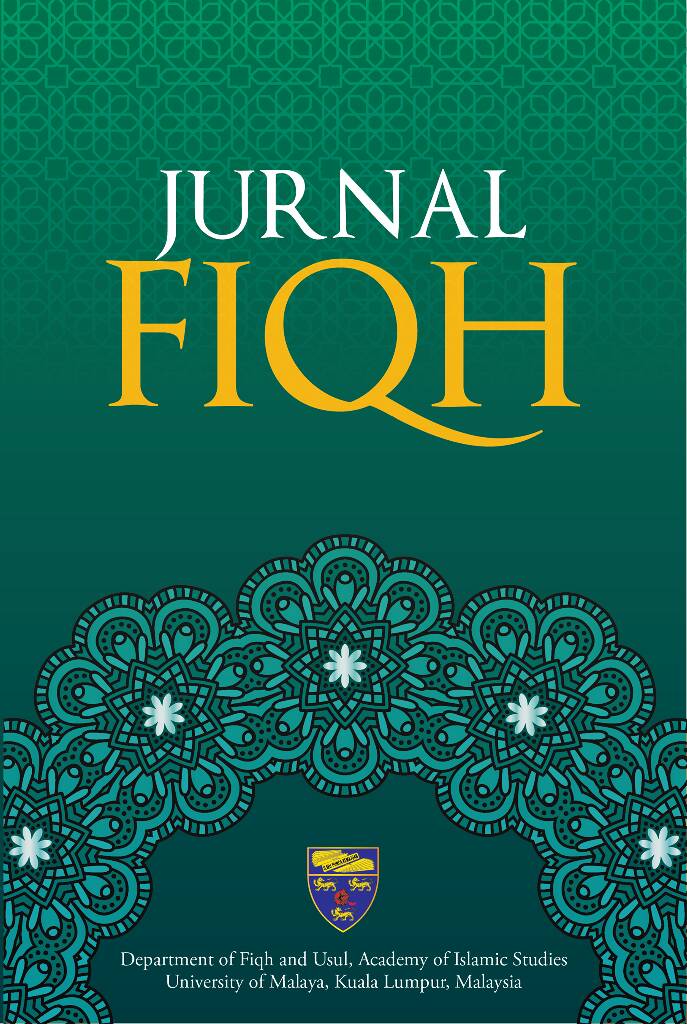The Fiqhi Thought of Price Volatility in Crypto Asset
DOI:
https://doi.org/10.22452/fiqh.vol19no1.2Keywords:
cryptocurrency, crypto asset, Islamic finance, Shariah compliantAbstract
Cryptocurrency gains the popularity among digital investors almost in a decade. Starting with bitcoin or BTC as a pioneer coin in the crypto market, today there are more than five thousand different coins are being traded at every second worldwide. The acceptance among giant companies and countries had shown positive trend that this new asset class might have a bright future. Replacing fiat currency as main currency is a possible even there are too many hurdles and challenges to be solved but to be treated as an investment mode could be accepted in today’s situation. This paper aims to seek a clarification on how Shariah ruling in trading crypto asset, is it Shariah compliant? or at least Shariah-friendly especially when the digital asset always been criticized for being too volatile in their prices that deemed as gharar. As a result, cryptocurrency in general is a legal asset to be traded from Shariah view even it vulnerable to price volatility due to clarity of the transaction, market factors that create the prices and for security purposes. Besides, the trade does not contain any riba element, gharar and maysir also involve in prohibited business.
Downloads
References
Abdul Rahman, Al-Juzairi. 2003. Al-Fiqh ’ala Mazahib al-Arba'ah. Lubnan: Dar al-Kutub al-’Ilmiyah
Ahmad Sa’ad ‘Ali al-Bar'iy (2019), Al-’Umlat al-Iftirodhiyah al-Musyaffarah. Jurnal al-Ifta al-Misriyyah. No. 39. Vol.11.
Ahmad Sa’ad ‘Ali al-Bar'iy. 2019. Al-’Umlat al-Iftirodhiyah al-Musyaffarah. Jurnal al-Ifta al-Misriyyah. Bil. 39. Jil.11. Ms. 12-119.
Al-Bayyumi, Ahmad bin Muhammad (2019), Sadd al-Zara’i ‘inda al-Usuliyyin wa Tatbiqotuha fi Majal al-Qodhoya al-Tibbiyyah al-Mu’asirah. Article 4, No. 37, Vol. 11, Spring 2019.
Al-Fasi, Muhammad bin Ahmad (n.d), Al-Itqan wa al-Ihkam fi Syarh Tuhfat al-Hukkam, Beirut: Dar al-Makrifah.
Al-Nawawi, Yahya bin Sharaf (n.d), Al-Majmuk Syarh al-Muhazzab, Beirut: Dar al-Fikr.
Alp-Mawardi, Ali bin Muhammad (1999), Al-Hawi al-Kabir, Beirut: Dar al-Kutub al-’Ilmiyah, Jil.3, ms. 259.
Bariviera, Aurelio F., and Ignasi Merediz‐Solà. “WHERE DO WE STAND IN CRYPTOCURRENCIES ECONOMIC RESEARCH? A SURVEY BASED ON HYBRID ANALYSIS”. Journal of Economic Surveys 35, no. 2 (2021): 377–407. doi:10.1111/joes.12412.
Batwa, A., & Norrman, A. (2021). Blockchain Technology and Trust in Supply Chain Management: A Literature Review and Research Agenda. Operations and Supply Chain Management: An International Journal, 14(2), 203-220.
Baur, D., K. Hong and A. Lee. “Bitcoin: Medium of Exchange or Speculative Assets?” Journal of International Financial Markets, Institutions and Money 54 (2017): 177-189.
BBVA Research Department (2013)
Bin Salamon, Hussin, Mansoureh Ebrahimi, and Kamaruzaman Yusoff. “Speculation: The Islamic Perspective; A Study on Al-maisir (gambling)”. Mediterranean Journal of Social Sciences, 2015. doi:10.5901/mjss.2015.v6n1s1p371.
Bitcoin: A chapter in digital currency adoption
Cointelegraph. (2017). Is Bitcoin Halal? How Cryptocurrency Confirms with islam and Sharia. Retrieved from https://cointelegraph.com/news/is-bitcoin-halal-how-cryptocurrency-conforms-with-islam-and-sharia
Daiban b Mohd al-Daiban. 2011. Al-Mu’amalat al-Maliyah Isolah wa Mu’asirah. N.p.
David Lee Kuo Chuen and Lindo Low. (2018). Inclusive Fintech Blockchain Cryptocurrency and ICO. Singapore: World Scientific Publishing Co. Ltd.
Dhiyauddin, Muhamamd bin Muhammad Ibnu al-Ikhwah (1976), Ma’alim al-Qurbah fi Tolab al-Hisbah, Cairo: Maktab al-‘Ilam al-Islamiy.
Dinh TTA, Liu R, Zhang M, Chen G, Ooi BC, Wang J (2018) Untangling blockchain: a data processing view of blockchain systems. IEEE Trans Knowl Data Eng 30(7):1366–1385. https://doi.org/10.1109/Tkde.2017.2781227
Dudukalov, E. V., Geroeva, Y. A., Shtepa, M. A., & Ushakov, D.. (2021). The crypto currency as money of digital economy. E3S Web of Conferences, 244, 10021. https://doi.org/10.1051/e3sconf/202124410021
Dyhrberg, A.H. (2016) Bitcoin, Gold and the Dollar: A Garch Volatility Analysis. Finance Research Letters, 16, 85-92. https://doi.org/10.1016/j.frl.2015.10.008
F. Garcia-Monlean et al. (2021). Technological Forecasting and Social Change. P. 162.
Fry, J., & Cheah, E. T. (2016). Negative bubbles and shocks in cryptocurrency markets.International Reviewof Financial Analysis, 47,343–352.
Hald, K. S., & Kinra, A.. (2019). How the blockchain enables and constrains supply chain performance. International Journal of Physical Distribution & Logistics Management, 49(4), 376–397. https://doi.org/10.1108/ijpdlm-02-2019-0063
Harry Markowitz The Journal of Finance, Vol. 7, No. 1. (Mar., 1952), pp. 77-91.
https://bitvo.com/crypto-traders-are-made-with-soft-skills/
Jake Ryan. Crypto Asset Investing in The Age of Autonomy. Wiley. (2021).p.98.
Joe McKenzie. 2019. The New Money How and Why Cryptocurrency Has Taken Over The World. London: LID Publishing Limited.
Katsiampa, P. (2017). Volatility estimation for bitcoin: A comparison of GARCH models.Economics Letters,158,3–6.
Khoutem Ben Jedidia and Hichem Hamza (2021). The Forms and Effects of Cryptocurrencies in a Dual Banking System. Islamic Fintech Insights and Solutions. Book edited by Mohd Ma’sum Billah. Palgrave Mcmillan.
King, T., Koutmos, D., 2021. Herding and feedback trading in cryptocurrency markets. Annals of Operations Research 300, 79–96.. doi:10.1007/s10479-020-03874-4
Meera, A. (2018). Cryptocurrencies From Islamic Perspectives: The Case Of Bitcoin. Buletin Ekonomi Moneter Dan Perbankan, 20(4), 475-492. https://doi.org/10.21098/bemp.v20i4.902
Ministry of Waqf and Islamic Affair of Kuwait. 1428 H. Al-Mausu'ah al-Fiqhiyyah al-Kuwaitiyah.
Mufti Faraz Adam. (2017). Bitcoin: Shariah Compliant? Amanah Finance Consultancy. Retrievd from https://afinanceorg.files.wordpress.com/2017/08/research-paper-on-bitcoin-mufti-faraz-adam.pdf
Muhammad Taqi al-Usmani (2015), Fiqh al-Buyu' ‘ala al-Mazahib al-Arba’ah ma’ al-Tatbiqatuha al-Mu’asirah, Karachi: Maktabah Ma’arif al-Quran.
Muhammad Taqi al-Usmani. 2015. Fiqh al-Buyu'.Maktabah Ma’arif al-Quran. Karachi: Pakistan
N. Karp, M. Nava, B. Stacey, C. Cuesta, O. Gouvela, A. Neut
Rafiq Yunus al-Misry. 2009. Al-Gharar wa Adam al-Taakkud. Al-Azmah al-Maliyah al-’Alamiyah. Asbab wa Hulul min Manzur Islamiy. Jeddah: Markaz al-Nasyr al-’Ilmiy.
Suwailim S. (2018) About Crypto-Currencies. Paper presented at Conference organized at University Muhammad Bin Saud al-Islamiyah on 14 August 2018.
Tawfik Azrak, and Hani Hazaa. 2021. “The Profit/Gain from Islamic Law of Contract Perspective and The Issue Of Ownership Risk (Daman al‐Milkiyyah)”. Journal of Islamic Finance 10 (April):111–116.https://journals.iium.edu.my/iiibf-journal/index.php/jif/article/view/533.
Trubnikova, N. (2017). RUSSIAN ADVERTISING MARKET: RELEVANT INDICATORS AND FACTORS OF CURRENT DEVELOPMENT. The EUrASEANs: Journal on Global Socio-Economic Dynamics, (4(5), 28-35. Retrieved from https://euraseans.com/index.php/journal/article/view/50











